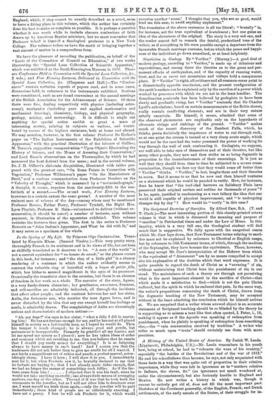The Scriptural Doctrine of Sacrifice. By Alfred Carr, B.A. (T.
and T. Clark.)—The most interesting portion of this closely-printed octavo volume is that in which is discussed the meaning and purpose of " sacrifice " in Patriarchal times and under the Law of Moses. In this inquiry, which is a very full one, the theological student will find much that is suggestive. We fully agree with the exegetical canon which Mr. Carr lays down, that New-Testament terms relating to sacri- fice must not be explained by reference to Classical or English usage, but by reference to Old-Testament terms, of which, through the medium of tho Septuagint, they have become the equivalents. Those, however, who may accept Mr. Carr's interpretation of the Hebrew term which is the equivalent of " Atonement " are by no means compelled to accept also his explanation of the doctrine which that word expresses. It is quite possible to regard the death of Christ as a "covering" of sin, without maintaining that Christ bore the punishment of sin in our stead. The maintainers of such a theory err through not perceiving what is the most important element in the sacrifice of Christ—that which made it a satisfaction to God—which is not the pain Christ suffered, but the spirit in which he endured that pain. In the same way, the writer's propositions concerning the death of Christ, drawn from the dogmatic teaching of the New Testament, may be accepted without in the least admitting the conclusion which he himself arrives at. We are surprised that a writer whose avowed object is an accurate statement of Scriptural teaching should be so blinded by the theory he is supporting as to misuse a text like that often quoted, L Peter, i., 18, making it appear as if the Apostle was speaking of redemption from punishment, when he plainly is speaking of redemption from something else,—the "vain conversation received by tradition." A writer who relies so much upon " texts " should certainly use them with more precision.


































 Previous page
Previous page